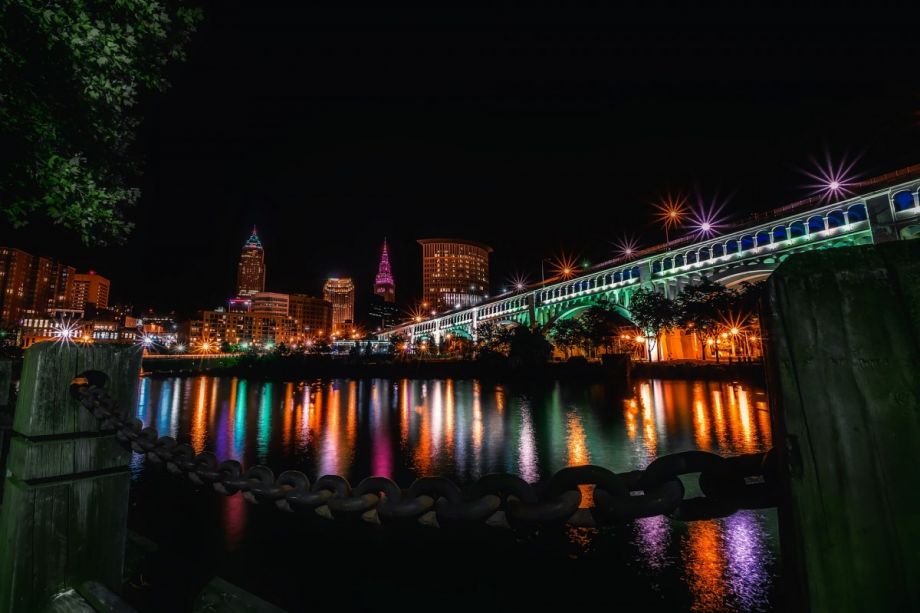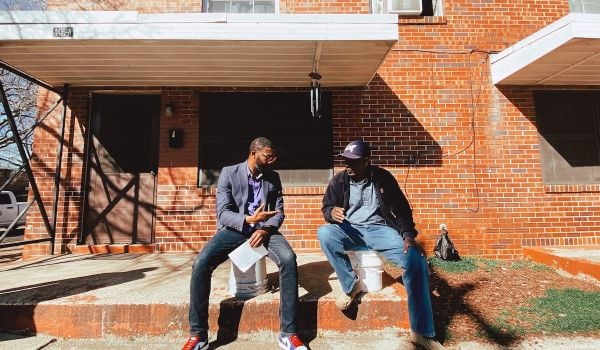JoJo African Market, which opened in April on Cleveland’s West Side, may be small when compared to big grocery chains — but shoppers there are treated to hard-to-find items.
There’s a freezer full of smoked “kuta” fish (catfish, herring or barracuda, depending on the season). Shelves are stocked with “fufu” mix, a flour made from green plantains, and packaged “ga kenkey,” fermented cornmeal paste that can be served with spicy red pepper sauce.
Owner Josephine Jukoryan, a Liberia native, moved to Cleveland three years ago from New York pursuing the dream of opening a market.
“My family had been in the food market business back in Africa,” Jukoryan says, “and we had wanted to open our own business, but couldn’t do that [in New York] when we were paying $2,000 a month for an apartment that was just two bedrooms and wasn’t very good either.”
She and her husband and two children obtained hard-to-get visas eight years ago because of a Liberian civil war. They were part of the Kru tribe, and were unsafe because of the intertribal warfare. They had virtually nothing when they arrived in New York.
“We wanted to improve our life and have better opportunities and be safe, and coming to the United States was a dream for us for many reasons,” she says. They’re all U.S. citizens now.
The Jukoryans had some distant family that had emigrated to Ohio and acquaintances there from Monrovia, Liberia.
“It was a very good idea to move to Cleveland,” Jukoryan says, “because working so you can afford your rent and have nothing else isn’t very good for your family, and especially your children.”
Her rent for a four-bedroom house is $750 per month. And the monthly rent for the 1,200-square-foot commercial space for the food market is about $650.
“We came to Cleveland to improve our lives and we can see that happening,” she says.
The Jukoryan family are among the refugees and immigrants making an impact on Cleveland, where many people see the newcomers contributing to a healthier ecosystem of entrepreneurship, and moving into housing left unoccupied since the foreclosure crisis.
Global Cleveland, a local organization that promotes immigration and foreign trade in the city, is working on an effort dubbed “International Village,” on the West Side, in an area near two trendy neighborhoods, Detroit Shoreway and Ohio City. With support from the city and state, and private foundation money, they’ve been developing the concept for a few years, to create more affordable housing for refugees relocating to Cleveland by renovating abandoned houses and building new homes. Six vacant properties have already been redone. Ten more are under construction, and 54 other properties are in the pipeline.
“A couple years ago, I was going door to door and saw this neighborhood had a history of working-class Puerto Ricans who had paid off their mortgages and stayed, but had to live with so many vacant lots and homes that people had walked away from,” says Joe Cimperman, a former Cleveland City Council member. He’s now president of Global Cleveland.
Cimperman also saw a K-12 public school that specialized in English as a Second Language learning — the only one like it in the state of Ohio — where more than 30 different languages are spoken.
“We could see from the beginning that the school was the meeting and center point for so much in the immigrant community,” Cimperman says. “So we just started thinking about how we could join up the need for the immigrant population that wants to live near their kids’ school, and to try to fix the problem of abandoned houses in the neighborhood at the same time.”
In May, Global Cleveland got a $180,000 grant from the Cleveland Foundation. Low-Income Housing Tax Credits will be used to build 22 homes through the state-run Ohio Housing Finance Agency, which uses a rent-to-own payment plan. Rental payments for 15 years count as mortgage payments, and a house will then be turned over to the renters with a new 15-year mortgage in their name. The approach helps maintain stability in a neighborhood.
“We don’t want to help someone move into a house, and then have them move out and go somewhere else after a year or so,” Cimperman says.
About 1,000 refugees have arrived in Cuyahoga County (where Cleveland is located) annually in recent years, but that is in flux now due to the national political discussion about welcoming refugees into the U.S. The Cleveland area’s number is expected to drop to about 600 this year. About 100 or so of those newcomers will likely land on the West Side because of personal contacts from their native countries. Most are from Afghanistan, Syria, African countries such as Congo, and Nepal.
“What we are finding here in Cleveland is that the refugee community is very stable for a city neighborhood because they are all about working hard, investing in opportunity for their children, and not just working to pay the rent, but to save money,” says Tony Bango, director of International Village for Metro West Community Development, a partner in the project. “We’ve found in this neighborhood that the longtime homeowners see them as very good neighbors.”
In 1920, Cleveland had a population of about 800,000 and about 30 percent of those (about 240,000) were foreign-born. In 2014, according to census figures, the city’s population was about 390,000 with only about 18,600 foreign-born (4.7 percent). That percentage is far lower than other Midwest cities like Detroit, Chicago, Milwaukee, Buffalo, Columbus and Indianapolis.
Daryl Anderson, president of Mustard Seed Development, a construction company doing some of the housing rehabs for the International Village, says he sees a larger attitude shift in Cleveland.
“I’m glad Cleveland is finally seeing the market and throwing the welcome mat down,” Anderson says. “When [immigrants] get here, they say they love it. I’ve hired a number of them. [International Village] is a smart program without much government investment, but plenty of upside for a neighborhood and the city in the future.”

















